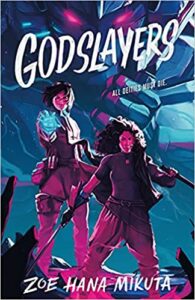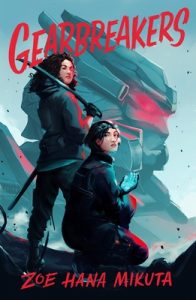In her acknowledgements at the end of Godslayers, the second book of her Gearbreakers duology, Zoe Hana Mikuta writes, “Okay. So. I’ve been incredibly mean to my characters.” She is spot on. Eris, Sona, and the rest of the cast go through so much in this book. There’s psychological terror, disfigurement, death of close friends, and a constant looming threat of annihilation. As a reader fully invested in the well-being of these characters (thanks to Zoe’s fantastic writing), I couldn’t help but feel their pain and anguish every step of the way. But, in the end, it was all worth it. It all drove home the central theme of the entire duology: the power of love and hope can help us endure and triumph over all.
Warning: mild spoilers ahead
At the end of Gearbreakers, Sona, former Windup pilot turned Gearbreaker, and Eris, life-long Gearbreaker, had struck a massive blow to the tyrannical Godolia. The majority of the Windups (mechas) worshiped as Gods by the citizens of Godolia and symbols of oppression by everyone else have been destroyed. The leadership of the empire has been reduced to one Zenith named Enyo, a teenager seemingly unprepared for the role he has been pushed into. But Eris and Sona paid dearly for this success. Both were captured, and while Eris has been held prisoner and tortured, Sona has been corrupted, a form of cybernetic and psychological brainwashing. She now believes that Eris had kidnapped and tortured her into attacking Godolia rather than the truth: that she and Eris escaped together and fell in love. She’s also been made the right-hand woman of the last Zenith as he seeks to assert his power and destroy the rebellion. However, Sona’s corruption is not complete. No matter what the doctors of Godolia and Enyo do, there is always her love for Eris holding her back and keeping the corruption from completely taking over her mind. When Enyo orders her to kill Eris, she can’t, instead standing idly by as she escapes. Eris, realizing that Sona can be saved, knows what she must do: bring back the love of her life.
When Sona accompanies Enyo to a gala to open a new Windup pilot academy in the city of Ira Sol, Eris knows this is her chance to rescue Sona. Little does she know that this is actually a trap meant to capture her and her sister. Through the help of her crew, she narrowly escapes the trap and rescues Sona while also helping the Gearbeakers capture the city of Ira Sol. Sona initially resists Eris’ attempts to help her see the truth of their relationship. Eventually, though, she is able to overcome her corruption and remember how in love with Eris she is. Over the following months, the pair rekindle their relationship and try to take care of their found family of a crew. However, Sona still struggles with the lingering effects of her corruption. Even worse, almost every good moment is met with tragedy as Godolia and their true believers continue to try to kill them. Eris, Sona, and the rest of the Gearbreakers suffer tragedy after tragedy until they realize that the only way to end it is to take down Godolia once and for all.
As I read this book, I couldn’t help but see the struggles Eris, Sona, and the rest of the Gearbreakers go through as powerful metaphors for the lives and struggles of queer people in an often tyrannical conservative religious society. While Eris has fought against Godolia all her life, deep down her ultimate goal isn’t its complete destruction. Rather, her goal is simple: keep the love of her life and her found family safe. Every day, she fights to help Sona recover from her torturous corruption. Every day, she fights to eke out a peaceful and happy life for the members of her family and the rest of Gearbreaker society. Sona tries to do the same while also hoping against hope that she can save Enyo, who she believes can be saved despite his complicity in all of the things done to her and the Gearbreakers. She’s seen him struggle with the weight of all his new responsibility and thinks he may not be a true believer. And yet, despite all of their best efforts, every little victory is met with defeats inflicted on them from a society wholly devoted to the deific worship of Windups and Zeniths. Despite this, they continue to fight on.
Later in her acknowledgements, Zoe writes that, ultimately, this book and the entire duology are a story about love and hope and how they can help us persevere in a world that seeks to destroy us and our communities. I wholeheartedly agree. Godslayers is not only a thrilling dystopian science fiction story filled with great action and well-written characters, but also a one that shows us that while all may appear lost, we can continue on. By holding on to the love we have for each other and the hope that, together, we can make it through, we can persevere. Our communities can survive. Not only that, but through the collective power of love and hope, one day we will be victorious. In times like these, this is a powerful message that every member of the queer community needs to hear.


